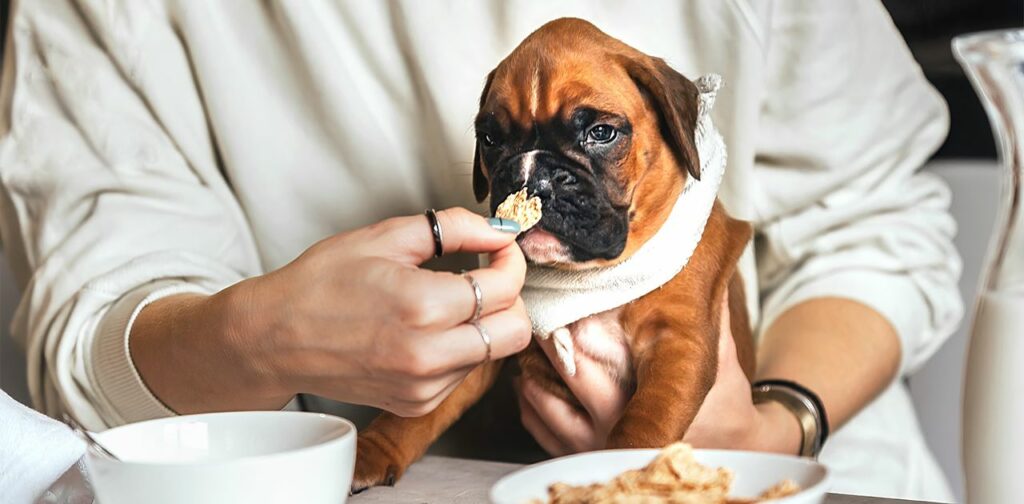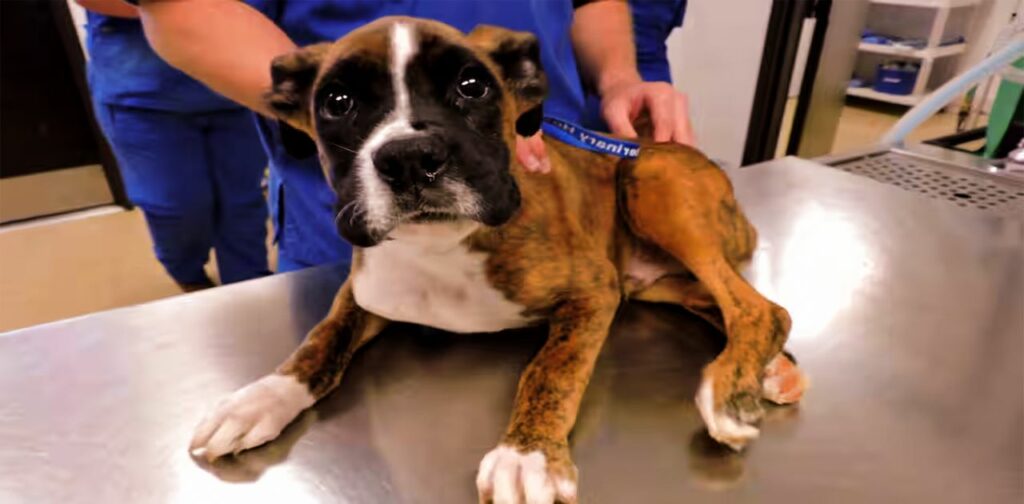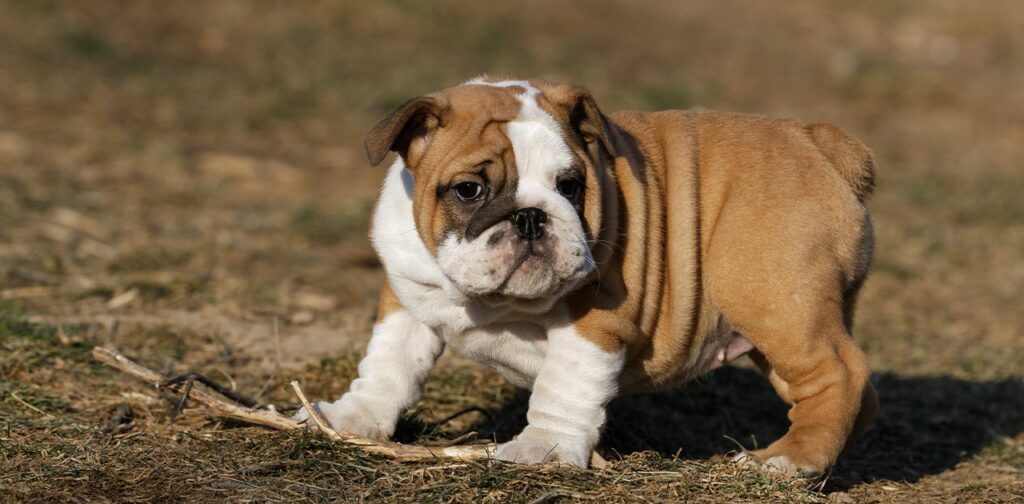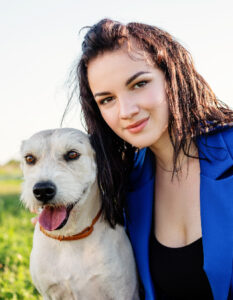How much to feed a boxer puppy? A boxer puppy’s growth rate is explosive, literally! In just a few short months, they transform from a cuddly ball of fur weighing a couple of pounds into a majestic athlete tipping the scales at 70 pounds or more.
So, these loyal companions require special attention, especially when it comes to their diet. Feeding your boxer puppy the right amount of food is crucial for their growth, development, and overall health.
Proper feeding can prevent long-term health issues like obesity, poor muscle development, and digestive problems.
This blog covers everything you need to know about feeding a Boxer puppy at various stages. We will explain how many calories do boxers eat, create a feeding schedule, and recognize signs of underfeeding or overfeeding.
By the end, you will have a clear understanding of how to nourish your Boxer puppy for optimal health and happiness. So, let’s dive in and learn how to feed your Boxer puppy the right way!
Table of Contents
ToggleHow Much to Feed a Boxer Puppy?

Age-Appropriate Feeding Amounts
First, take a look at the following boxer puppy feeding chart. It is a brief age-appropriate feeding guide for your boxer guide. If it’s too short for you, don’t worry though, we’re going to explain it for you.
| Age | Feeding Method | Frequency | Portion Size |
| 2-3 Weeks | Mother’s milk or puppy milk replacer | Every 2-3 hours | As needed |
| 8 Weeks | Softened puppy food | Free-fed | As needed |
| 12 Weeks | Puppy food | 3 meals/day | 1 cup/day |
| 3-6 Months | Puppy food | 3 meals/day | 2-3 cups/day |
| 6 Months-2 Years | Puppy food | 3 meals/day | Based on weight/activity level |
| Adult (2+ Years) | Adult dog food | 1-2 meals/day | 3-5 cups/day |
2-Week and 3-Week Old Boxer Puppies
2 week old boxer puppies rely entirely on their mother’s milk. Same goes for 3 week old boxer puppies too. This milk provides all the nutrients they need. If the mother is not available, use a high-quality commercial puppy milk replacer.
This will ensure the puppies get the necessary nutrients. Feed the puppies every 2-3 hours. Keeping them warm is also crucial at this stage.
8-Week Old Boxer Puppy
A 8 week old boxer puppy will start transitioning to solid food. Begin with high-quality puppy food. Soften it with water or puppy milk replacer.
This makes it easier for the puppy to eat. Free-feeding is recommended at this stage. Keep fresh food accessible at all times. This helps the puppy adapt to its new home.
12-Week Old Boxer Puppy
A 12 week old boxer puppy should be eating solid food. This can be either dry or moistened food. Establish a feeding schedule with 3 meals per day. Regular meals help promote good eating habits and steady growth.
3-Month, 4-Month, and 5-Month Old Boxer Puppies
Now onto
- 3 month old boxer puppy
- 4 month old boxer puppy
- 5 month old boxer puppy
Continue feeding high-quality puppy food during these months. Provide 3 meals per day, plus snacks. Boxer puppies may go through a “skinny phase.” This means they might need more frequent feeding to maintain a healthy weight.
6-Month to 2-Year Old Boxer
From 6 months to 2 years, keep feeding your Boxer high-quality puppy food. Maintain a schedule of 3 meals per day. Adjust portions based on the puppy’s weight and activity level. This ensures they get enough nutrients without overeating.

Adult Boxer (2 Years and Up)
At 2 years old, transition your Boxer to adult dog food. This food meets their changing nutritional needs. Feed them 1 to 2 meals per day. If feeding only once a day, consider giving snacks. This helps prevent rapid eating, which can cause bloat.
Calorie Requirements for Boxer Puppies
Take a look at the chart that explains the calorie requirement for boxer puppies.
| Life Stage | Daily Calories per Pound of Body Weight |
| Puppy | 55-75 |
| Active Adult | 35-45 |
| Less Active/Senior | 25-35 |
- Puppies: Boxer puppies need about 55 to 75 calories per pound of body weight each day. This high calorie intake supports their rapid growth and high energy levels.
- Active Adults: Once they grow up, active adult Boxers require about 35 to 45 calories per pound of body weight daily. This amount keeps them strong and energetic.
- Less Active or Senior Dogs: For less active or older Boxers, their calorie needs drop to about 25 to 35 calories per pound of body weight each day. This lower intake helps prevent weight gain and supports their slower metabolism.
Now, let’s say you have a Boxer puppy weighing 20 pounds. To find out how many calories they need, use the puppy calorie requirement range of 55 to 75 calories per pound. Multiply their weight by the lower and upper calorie limits:
- Lower End: 20 pounds x 55 calories = 1,100 calories per day
- Upper End: 20 pounds x 75 calories = 1,500 calories per day
So, your 20-pound Boxer puppy needs between 1,100 and 1,500 calories each day to grow healthy and stay active. Adjust their food portions to meet these calorie needs and ensure balanced nutrition.
Feeding Guidelines Based on Weight
Now let’s talk about another way you can determine how much to feed a boxer puppy. This is the feeding chart for your dog which can tell you how much to feed it by weight. Take a look at the following chart.
| Boxer Weight | Daily Food Amount |
| 10-15 Pounds | ~1 cup |
| 20-30 Pounds | 2-3 cups |
| 55 Pounds | 2 cups |
| 60 Pounds | 3 cups |
| 65 Pounds | 4 cups |
| 70 Pounds | 5 cups |
Understanding the Chart
This chart provides a quick reference for determining the daily food requirements of your Boxer based on their weight. It’s designed to help you ensure your dog gets the right amount of nutrition to maintain a healthy weight and overall well-being.
- Growth Phases:
10-15 Pounds: Typically, young puppies or smaller Boxers will fall into this category. At this stage, they require approximately 1 cup of food daily to support their rapid growth and high energy levels.
20-30 Pounds: As Boxers grow, their caloric and nutritional needs increase. Dogs in this weight range need 2-3 cups of food daily. This ensures they continue to grow healthily and maintain their playful energy. - Adult Boxers:
55 Pounds: An adult Boxer weighing around 55 pounds needs about 2 cups of food each day. This amount provides the necessary nutrients without overfeeding.
60 Pounds: For Boxers at 60 pounds, 3 cups of food daily are recommended. This increase accounts for their larger body mass and higher energy expenditure.
65 Pounds: A Boxer weighing 65 pounds should receive 4 cups of food each day to maintain their muscle mass and energy levels.
70 Pounds: The heaviest in this guide, a 70-pound Boxer needs around 5 cups of food daily. This ensures they get enough calories to support their active lifestyle and maintain their health.
Signs Your Puppy is Under or Overfed
Proper nutrition is crucial for the healthy growth and development of your Boxer puppy. Monitoring their diet and recognizing signs of underfeeding or overfeeding can help you make necessary adjustments to ensure their well-being.
| Condition | Signs | Risks |
| Underfeeding | Visible ribs, lethargy, frequent hunger | Stunted growth, unhealthy weight, skin problems, digestive issues, low immunity |
| Overfeeding | Excess weight, decreased activity, digestive issues | Obesity, heart disease, arthritis, delayed healing |
Underfed

Visible Ribs:
One of the most noticeable signs that your puppy is underfed is the visibility of their ribs. While a healthy puppy should have a well-defined waist, seeing the ribs prominently indicates they are not getting enough calories or nutrients to support their growth and maintain a healthy body condition.
Lethargy:
An underfed puppy may exhibit low energy levels and appear lethargic. Without adequate nutrition, puppies lack the energy they need for normal activities and play. This can also impact their mental alertness and overall vitality.
Frequent Hunger:
If your puppy is constantly seeking food and appears hungry even after meals, it could be a sign that their nutritional needs are not being met. Persistent hunger can lead to behaviors such as scavenging and begging for food.
Overfed

Excess Weight:
Overfeeding can lead to rapid weight gain and obesity. Excess weight puts additional strain on a puppy’s developing bones and joints, which can lead to long-term health issues. You should be able to feel, but not see, the ribs when you run your hands along your puppy’s sides.
Decreased Activity:
An overfed puppy may become less active and more sedentary. Carrying extra weight can make it difficult for them to engage in normal puppy activities, leading to decreased playfulness and overall activity levels.
Digestive Issues:
Overfeeding can cause digestive problems such as diarrhea, vomiting, and bloating. A puppy’s digestive system can become overwhelmed by too much food, leading to discomfort and health issues. Regularly experiencing these symptoms may indicate that their diet needs to be adjusted.
What to Feed Your Boxer Puppy
Dry Kibble
- Advantages: Standard diet for most canines; supports dental health by preventing plaque buildup.
- Considerations: Worst dog food for boxers with allergies could be fillers like wheat, corn, and soy as these cause the allergy.
Wet Food
- Advantages: High palatability; great as a topper.
- Considerations: Higher in calories and can lead to weight gain; potential for dental issues.
Raw Diet
- Advantages: Provides unprocessed nutrition; eliminates harmful preservatives.
- Considerations: Ensure a balanced diet to avoid nutrient deficiencies; consult a vet to mitigate risks of bacterial contamination.
Now, we know this isn’t much. You may be looking for best dog food for boxers with gas. You may be looking for best dog food for boxers with allergies. To have a better and granular understanding of the best food for boxer puppy, you can take a look at the following article: Best Food for a Boxer Puppy: Top Picks 2024.
When to Switch from Puppy to Adult Food
| Age | Transition Duration | Method |
| 18-24 Months | 5-7 days | Gradually mix increasing amounts of adult food with puppy food |
Transition your Boxer to adult food between 18 to 24 months. Gradually switch over 5-7 days to avoid digestive issues.
Why Won’t My Boxer Puppy Eat?
Possible Causes
- Pickiness
- Infections (e.g., viruses, intestinal parasites)
- Pain (e.g., teething, inflammation)
- Organ issues (e.g., liver, kidneys)
- Stress
- Bowel obstruction
Encouraging Appetite (Using Homemade Food for Boxer Dogs)
- Offer a bland diet (For instance: Plain boiled chicken and rice)
- Mix dry kibble with wet food to enhance flavor and texture
- Pour chicken broth into food to add moisture and flavor
- Add unseasoned cooked chicken to increase palatability
When to Consult a Vet
Take a look at the following red flags:
- Persistent refusal to eat
- Lethargy, crying, stomach bloating, swollen rectum, fever, vomiting, diarrhea
If you face such a situation, don’t delay in consulting a vet.
Monthly Cost Estimation
By now you should be able to determine how much to feed a boxer puppy. Now we will take a look at your ideal monthly budget for your boxer dog.
Feeding your Boxer the right amount of high-quality dog food is essential for their health. If you choose premium commercial dog food, you can expect to pay about $1.70 per pound. This type of food typically contains around 400 calories per cup.
Let’s consider an active adult Boxer that weighs 70 pounds. This dog needs about 2,800 calories each day to stay healthy and active. To find out how much food this Boxer needs daily, we can do a simple calculation: 2,800 calories divided by 400 calories per cup equals 7 cups of food per day.
Now, let’s calculate the monthly food requirement. If the Boxer eats 7 cups of food every day, we multiply that by 30 days in a month. So, 7 cups times 30 days equals 210 cups of food each month.
Next, we need to figure out the cost. A 30-pound bag of premium dog food typically costs around $51 and contains about 120 cups of food. To meet the Boxer’s monthly food needs, you would need about 1.75 bags of this dog food. We can find this number by dividing 210 cups by the 120 cups in one bag. Then, we multiply 1.75 bags by $51, which gives us approximately $89.25 for the monthly feeding cost.
So, if you have an active 70-pound Boxer, you should budget around $89.25 each month for their premium commercial dog food. This ensures your Boxer gets the necessary nutrients to stay active and healthy.
Let’s summarize the whole thing for a quick glance:
- Premium Commercial Dog Food: Approximately $1.70 per pound, containing an average of 400 calories per cup.
- Active Adult Boxer (70 pounds): Requires about 2,800 calories daily.
Daily Food Requirement: 2,800 calories ÷ 400 calories/cup = 7 cups daily.
Monthly Food Requirement: 7 cups x 30 = 210 cups.
Monthly Cost: 1.75 bags (30-pound bag) x $51 = approximately $89.25.
Special Considerations
- Shallow Bowls: Easier for Boxers to eat due to their short muzzles.
- Preventing Bloat: Offer multiple smaller meals and avoid vigorous exercise immediately after eating.
Conclusion
Understanding how much to feed a boxer puppy is essential for their growth and health. Understanding their nutritional needs helps them develop into strong and healthy adults. Use the guidelines in this blog to determine the appropriate feeding amounts based on age, weight, and activity level.
Watch for signs of underfeeding or overfeeding to make necessary adjustments. Providing high-quality food and proper portions ensures your Boxer puppy gets the nutrients they need to thrive. With the right care and attention, your Boxer will grow into a happy and healthy companion.
FAQ (Frequently Asked Questions)
1. How much should I feed my 8-week-old Boxer puppy?
For your 8-week-old Boxer pup, start with high-quality puppy food softened with water or puppy milk replacer. Just keep fresh food available all the time so they can eat whenever they want and get used to their new diet.
2. What should I feed my 2-3 week old Boxer puppy if the mother isn’t around?
If mom’s not around, you’ll need to use a good puppy milk replacer. Feed them every 2-3 hours and keep them nice and warm to make sure they’re getting everything they need.
3. How many calories does a Boxer puppy need each day?
Boxer puppies need about 55 to 75 calories per pound of body weight daily. So, if your pup weighs 20 pounds, they’ll need between 1,100 and 1,500 calories a day. Make sure you adjust their food portions to hit those numbers.
4. What are the signs that my Boxer puppy is underfed or overfed?
If your puppy’s ribs are showing, they’re super tired, or always hungry, they’re probably underfed. If they’re gaining weight fast, less active, or having digestive issues like diarrhea, they’re likely overfed. Keep an eye on these signs to adjust their food.
5. When should I switch my Boxer puppy to adult food?
Plan to switch your Boxer to adult food between 18 to 24 months old. Do it gradually over 5-7 days by mixing adult food with their puppy food to avoid any tummy troubles.
6. Why isn’t my Boxer puppy eating, and what can I do about it?
Puppies can stop eating for lots of reasons like being picky, infections, pain, stress, or other health issues. Try making their food more appealing by adding plain boiled chicken and rice, mixing dry food with wet, or adding some chicken broth.
If they still won’t eat or show other symptoms, take them to the vet.
7. How do I figure out the right amount of food for my Boxer puppy based on their weight?
Use the feeding chart based on their weight. For instance, a 20-30 pound Boxer puppy needs about 2-3 cups of food each day. Adjust the portions depending on how active they are and keep an eye on their weight and health.
8. What should I consider when picking food for my Boxer puppy?
Go for dry kibble for dental health, wet food if they’re picky, or raw diets for unprocessed nutrition. Make sure it’s high-quality food that suits their age and any special needs like allergies. And don’t forget to check with your vet!





